- Home
- Harlan Ellison
Angry Candy Page 5
Angry Candy Read online
Page 5
And pressed against the old man's shoulder, Billy Kinetta ran on only half sane: "He wasn't my friend, I never knew him, I'd never talked to him, but I'd seen him, he was just this guy, and there wasn't any reason to do that, he didn't know whether I was a good guy or a shit or anything, so why did he do that? He didn't need to do that. They wouldn't of seen him. He was dead before I killed them. He was gone already. I never got to say thank you or thank you or . . . anything!
"Now he's in that grave, so I came here to live, so I can go there, but I try and try to say thank you, and he's dead, and he can't hear me, he can't hear anything, he's just down there, down in the ground, and I can't say thank you . . . oh, geezus, geezus, why don't he hear me, I just want to say thanks . . . "
Billy Kinetta wanted to assume the responsibility for saying thanks, but that was possible only on a night that would never come again; and this was the day.
Gaspar took him to the bedroom and put him down to sleep in exactly the same way one would soothe an old, sick dog.
Then he went to his sofa, and because it was the only thing he could imagine saying, he murmured, "He'll be all right, Minna. Really he will."
When Billy left for the 7-Eleven the next evening, Gaspar was gone. It was an alternate day, and that meant he was out at the cemetery. Billy fretted that he shouldn't be there alone, but the old man had a way of taking care of himself. Billy was not smiling as he thought of his friend, and the word friend echoed as he realized that, yes, this was his friend, truly and really his friend. He wondered how old Gaspar was, and how soon Billy Kinetta would be once again what he had always been: alone.
When he returned to the apartment at two-thirty, Gaspar was asleep, cocooned in his blanket on the sofa. Billy went in and tried to sleep, but hours later, when sleep would not come, when thoughts of murky water and calcium night light on dark foliage kept him staring at the bedroom ceiling, he came out of the room for a drink of water. He wandered around the living room, not wanting to be by himself even if the only companionship in this sleepless night was breathing heavily, himself in sleep.
He stared out the window. Clouds lay in chiffon strips across the sky. The squealing of tires from the street.
Sighing, idle in his movement around the room, he saw the old man's pocket watch lying on the coffee table beside the sofa. He walked to the table. If the watch was still stopped at eleven o'clock, perhaps he would borrow it and have it repaired. It would be a nice thing to do for Gaspar. He loved that beautiful timepiece.
Billy bent to pick it up.
The watch, stopped at the V of eleven precisely, levitated at an angle, floating away from him.
Billy Kinetta felt a shiver travel down his back to burrow in at the base of his spine. He reached for the watch hanging in air before him. It floated away just enough that his fingers massaged empty space. He tried to catch it. The watch eluded him, lazily turning away like an opponent who knows he is in no danger of being struck from behind.
Then Billy realized Gaspar was awake. Turned away from the sofa, nonetheless he knew the old man was observing him. And the blissful floating watch.
He looked at Gaspar.
They did not speak for a long time.
Then: "I'm going back to sleep," Billy said. Quietly.
"I think you have some questions," Gaspar replied.
"Questions? No, of course not, Dad. Why in the world would I have questions? I'm still asleep." But that was not the truth, because he had not been asleep that night.
"Do you know what 'Gaspar' means? Do you remember the three wise men of the Bible, the Magi?"
"I don't want any frankincense and myrrh. I'm going back to bed. I'm going now. You see, I'm going right now."
" 'Gaspar' means master of the treasure, keeper of the secrets, paladin of the palace." Billy was staring at him, not walking into the bedroom; just staring at him. As the elegant timepiece floated to the old man, who extended his hand palm-up to receive it. The watch nestled in his hand, unmoving, and it made no sound, no sound at all.
"You go back to bed. But will you go out to the cemetery with me tomorrow? It's important."
"Why?"
"Because I believe I'll be dying tomorrow."
It was a nice day, cool and clear. Not at all a day for dying, but neither had been many such days in Southeast Asia, and death had not been deterred.
They stood at Minna's gravesite, and Gaspar opened his shooting stick to form a seat, and he thrust the spike into the ground, and he settled onto it, and sighed, and said to Billy Kinetta, "I'm growing cold as that stone."
"Do you want my jacket?"
"No. I'm cold inside." He looked around at the sky, at the grass, at the rows of markers. "I've been responsible, for all of this, and more."
"You've said that before."
"Young fella, are you by any chance familiar, in your reading, with an old novel by James Hilton called Lost Horizon? Perhaps you saw the movie. It was a wonderful movie, actually much better than the book. Mr. Capra's greatest achievement. A human testament. Ronald Colman was superb. Do you know the story?"
"Yes."
"Do you remember the High Lama, played by Sam Jaffe? His name was Father Perrault?"
"Yes."
"Do you remember how he passed on the caretakership of that magical hidden world, Shangri-La, to Ronald Colman?"
"Yes, I remember that." Billy paused. "Then he died. He was very old, and he died."
Gaspar smiled up at Billy. "Very good, Billy. I knew you were a good boy. So now, if you remember all that, may I tell you a story? It's not a very long story."
Billy nodded, smiling at his friend.
"In 1582 Pope Gregory XIII decreed that the civilized world would no longer observe the Julian calendar. October 4th, 1582 was followed, the next day, by October 15th. Eleven days vanished from the world. One hundred and seventy days later, the British Parliament followed suit, and September 2nd, 1752 was followed, the next day, by September 14th. Why did he do that, the Pope?"
Billy was bewildered by the conversation. "Because he was bringing it into synch with the real world. The solstices and equinoxes. When to plant, when to harvest."
Gaspar waggled a finger at him with pleasure. "Excellent, young fella. And you're correct when you say Gregory abolished the Julian calendar because its error of one day in every one hundred and twenty-eight years had moved the vernal equinox to March nth. That's what the history books say. It's what every history book says. But what if?"
"What if what? I don't know what you're talking about."
"What if: Pope Gregory had the knowledge revealed to him that he must readjust time in the minds of men? What if: the excess time in 1582 was eleven days and one hour? What if: he accounted for those eleven days, vanished those eleven days, but that one hour slipped free, was left loose to bounce through eternity? A very special hour . . . an hour that must never be used . . . an hour that must never toll. What if?"
Billy spread his hands. "What if, what if, what if! It's all just philosophy. It doesn't mean anything. Hours aren't real, time isn't something that you can bottle up. So what if there is an hour out there somewhere that . . . "
And he stopped.
He grew tense, and leaned down to the old man. "The watch. Your watch. It doesn't work. It's stopped."
Gaspar nodded. "At eleven o'clock. My watch works; it keeps very special time, for one very special hour."
Billy touched Gaspar's shoulder. Carefully he asked, "Who are you, Dad?"
The old man did not smile as he said, "Gaspar. Keeper. Paladin. Guardian."
"Father Perrault was hundreds of years old."
Gaspar shook his head with a wistful expression on his old face. "I'm eighty-six years old, Billy. You asked me if I thought I was God. Not God, not Father Perrault, not an immortal, just an old man who will die too soon. Are you Ronald Colman?"
Billy nervously touched his lower lip with a finger. He looked at Gaspar as long as he could, then turned away. He wa
lked off a few paces, stared at the barren trees. It seemed suddenly much chillier here in this place of entombed remembrances. From a distance he said, "But it's only . . . what? A chronological convenience. Like daylight saving time; Spring forward, Fall back. We don't actually lose an hour; we get it back."
Gaspar stared at Minna's grave. "At the end of April I lost an hour. If I die now, I'll die an hour short in my life. I'll have been cheated out of one hour I want, Billy." He swayed toward all he had left of Minna. "One last hour I could have with my old girl. That's what I'm afraid of, Billy. I have that hour in my possession. I'm afraid I'll use it, god help me, I want so much to use it."
Billy came to him. Tense, and chilled, he said, "Why must that hour never toll?"
Gaspar drew a deep breath and tore his eyes away from the grave. His gaze locked with Billy's. And he told him.
The years, all the days and hours, exist. As solid and as real as mountains and oceans and men and women and the baobab tree. Look, he said, at the lines in my face and deny that time is real. Consider these dead weeds that were once alive and try to believe it's all just vapor or the mutual agreement of Popes and Caesars and young men like you.
"The lost hour must never come, Billy, for in that hour it all ends. The light, the wind, the stars, this magnificent open place we call the universe. It all ends, and in its place — waiting, always waiting — is eternal darkness. No new beginnings, no world without end, just the infinite emptiness."
And he opened his hand, which had been lying in his lap, and there, in his palm, rested the watch, making no sound at all, and stopped dead at eleven o'clock. "Should it strike twelve, Billy, eternal night falls; from which there is no recall."
There he sat, this very old man, just a perfectly normal old man. The most recent in the endless chain of keepers of the lost hour, descended in possession from Caesar and Pope Gregory XIII, down through the centuries of men and women who had served as caretakers of the excellent timepiece. And now he was dying, and now he wanted to cling to life as every man and woman clings to life no matter how awful or painful or empty, even if it is for one more hour. The suicide, falling from the bridge, at the final instant, tries to fly, tries to climb back up the sky. This weary old man, who only wanted to stay one brief hour more with Minna. Who was afraid that his love would cost the universe.
He looked at Billy, and he extended his hand with the watch waiting for its next paladin. So softly Billy could barely hear him, knowing that he was denying himself what he most wanted at this last place in his life, he whispered, "If I die without passing it on . . . it will begin to tick."
"Not me," Billy said. "Why did you pick me? I'm no one special. I'm not someone like you. I run an all-night service mart. There's nothing special about me the way there is about you! I'm not Ronald Colman! I don't want to be responsible, I've never been responsible!"
Gaspar smiled gently. "You've been responsible for me."
Billy's rage vanished. He looked wounded.
"Look at us, Billy. Look at what color you are; and look at what color I am. You took me in as a friend. I think of you as worthy, Billy. Worthy."
They remained there that way, in silence, as the wind rose. And finally, in a timeless time, Billy nodded.
Then the young man said, "You won't be losing Minna, Dad. Now you'll go to the place where she's been waiting for you, just as she was when you first met her. There's a place where we find everything we've ever lost through the years."
"That's good, Billy, that you tell me that. I'd like to believe it, too. But I'm a pragmatist. I believe what exists. . . like rain and Minna's grave and the hours that pass that we can't see, but they are. I'm afraid, Billy. I'm afraid this will be the last time I can speak to her. So I ask a favor. As payment, in return for my life spent protecting the watch.
"I ask for one minute of the hour, Billy. One minute to call her back, so we can stand face-to-face and I can touch her and say goodbye. You'll be the new protector of this watch, Billy, so I ask you please, just let me steal one minute."
Billy could not speak. The look on Gaspar's face was without horizon, empty as tundra, bottomless. The child left alone in darkness; the pain of eternal waiting. He knew he could never deny this old man, no matter what he asked, and in the silence he heard a voice say: "No!" And it was his own.
He had spoken without conscious volition. Strong and determined, and without the slightest room for reversal. If a part of his heart had been swayed by compassion, that part had been instantly overridden. No. A final, unshakable no.
For an instant Gaspar looked crestfallen. His eyes clouded with tears; and Billy felt something twist and break within himself at the sight. He knew he had hurt the old man. Quickly, but softly, he said urgently, "You know that would be wrong, Dad. We mustn't . . . "
Gaspar said nothing. Then he reached out with his free hand and took Billy's. It was an affectionate touch. "That was the last test, young fella. Oh, you know I've been testing you, don't you? This important item couldn't go to just anyone.
"And you passed the test, my friend: my last, best friend. When I said I could bring her back from where she's gone, here in this place we've both come to so often, to talk to someone lost to us, I knew you would understand that anyone could be brought back in that stolen minute. I knew you wouldn't use it for yourself, no matter how much you wanted it; but I wasn't sure that as much as you like me, it might not sway you. But you wouldn't even give it to me, Billy."
He smiled up at him, his eyes now clear and steady.
"I'm content, Billy. You needn't have worried. Minna and I don't need that minute. But if you're to carry on for me, I think you do need it. You're in pain, and that's no good for someone who carries this watch. You've got to heal, Billy.
"So I give you something you would never take for yourself. I give you a going-away present . . . "
And he started the watch, whose ticking was as loud and as clear as a baby's first sound; and the sweep-second hand began to move away from eleven o'clock.
Then the wind rose, and the sky seemed to cloud over, and it grew colder, with a remarkable silver-blue mist that rolled across the cemetery; and though he did not see it emerge from that grave at a distance far to the right, Billy Kinetta saw a shape move toward him. A soldier in the uniform of a day past, and his rank was Lance Corporal. He came toward Billy Kinetta, and Billy went to meet him as Gaspar watched.
They stood together and Billy spoke to him. And the man whose name Billy had never known when he was alive, answered. And then he faded, as the seconds ticked away. Faded, and faded, and was gone. And the silver-blue mist rolled through them, and past them, and was gone; and the soldier was gone.
Billy stood alone.
When he turned back to look across the grounds to his friend, he saw that Gaspar had fallen from the shooting stick. He lay on the ground. Billy rushed to him, and fell to his knees and lifted him onto his lap. Gaspar was still.
"Oh, god, Dad, you should have heard what he said. Oh, geez, helet me go. He let me go so I didn't even have to say I was sorry. He told me he didn't even see me in that foxhole. He never knew he'd saved my life. I said thank you and he said no, thank you, that he hadn't died for nothing. Oh, please, Dad, please don't be dead yet. I want to tell you . . . "
And, as it sometimes happens, rarely but wonderfully, sometimes they come back for a moment, for an instant before they go, the old man, the very old man, opened his eyes, just before going on his way, and he looked through the dimming light at his friend, and he said, "May I remember you to my old girl, Billy?"
And his eyes closed again, after only a moment; and his caretaker-ship was at an end; as his hand opened and the most excellent timepiece, now stopped again at one minute past eleven, floated from his palm and waited till Billy Kinetta extended his hand; and then it floated down and lay there silently, making no sound, no sound at all. Safe. Protected.
There in the place where all lost things returned, the young man sat on the
cold ground, rocking the body of his friend. And he was in no hurry to leave. There was time.
A blessing of the 18th Egyptian Dynasty:
God be between you and harm in all the empty places you walk.
The Author gratefully acknowledges the importance of a discussion with Ms. Ellie Grossman in the creation of this work of fiction.
FOR HER, darkness never fell in the City of Light. For her, nighttime was the time of life, the time filled with moments of light brighter than all the cheap neon sullying the Champs-Élysées.
Nor had night ever fallen in London; nor in Bucharest; nor in Stockholm; nor in any of the fifteen cities she had visited on this holiday. This gourmet tour of the capitals of Europe.
But night had come frequently in Los Angeles.
Precipitating flight, necessitating caution, producing pain and hunger, terrible hunger that could not be assuaged, pain that could not be driven from her body. Los Angeles had become dangerous. Too dangerous for one of the children of the night.
But Los Angeles was behind her, and all the headlines about the INSANE SLAUGHTER, about the RIPPER, about the TERRIBLE DEATHS. All that was behind her. . . and so were London, Bucharest, Stockholm, and a dozen other feeding grounds. Fifteen wonderful banquet halls.
Now she was in Paris for the first time, and night was coming with all its light and all its promise.
In the Hôtel des Saints Pères she bathed at great length, taking the time she always took before she went out to dine, before she went out to find passion.
She had been startled to find the hotels in France did not provide washcloths. At first she had thought the chambermaid had forgotten to leave one, but when she called down to the reception desk, the girl who answered the phone could not understand what she was asking for. The receptionist's English was not good; and French was almost incomprehensible to Claire. Claire spoke Los Angeles very well: which was of no use in Paris. It was fortunate language was no barrier for Claire when she was ordering a meal. No problem at all.

 Repent, Harlequin! Said the Ticktockman
Repent, Harlequin! Said the Ticktockman Broken Glass
Broken Glass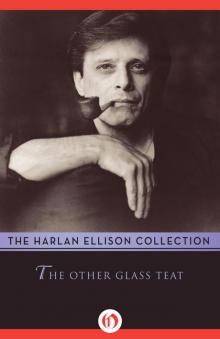 Other Glass Teat
Other Glass Teat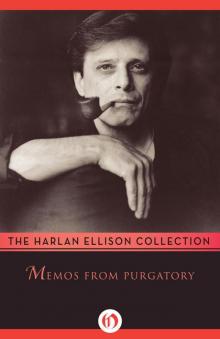 Memos From Purgatory
Memos From Purgatory I Have No Mouth and I Must Scream
I Have No Mouth and I Must Scream The Deadly Streets
The Deadly Streets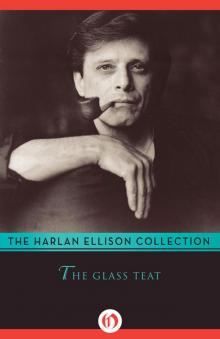 The Glass Teat
The Glass Teat Paingod and Other Delusions
Paingod and Other Delusions No Doors No Windows
No Doors No Windows Strange Wine
Strange Wine Harlan Ellison's Watching
Harlan Ellison's Watching Over the Edge/An Edge in My Voice
Over the Edge/An Edge in My Voice Troublemakers: Stories by Harlan Ellison
Troublemakers: Stories by Harlan Ellison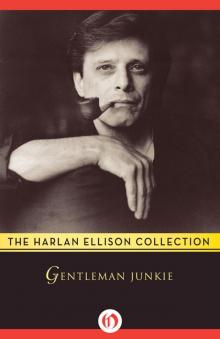 Gentleman Junkie and Other Stories of the Hung-Up Generation
Gentleman Junkie and Other Stories of the Hung-Up Generation The Kyben Stories
The Kyben Stories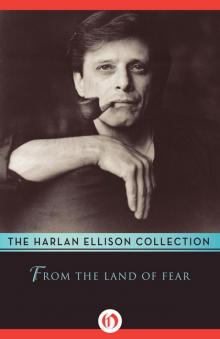 From the Land of Fear
From the Land of Fear The Top of the Volcano: The Award-Winning Stories of Harlan Ellison
The Top of the Volcano: The Award-Winning Stories of Harlan Ellison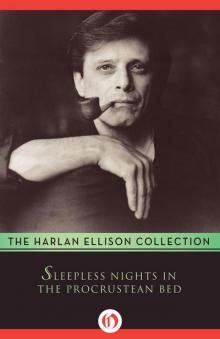 Sleepless Nights in the Procrustean Bed
Sleepless Nights in the Procrustean Bed Ellison Wonderland
Ellison Wonderland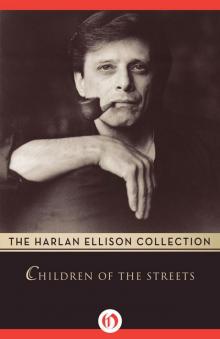 Children of the Streets
Children of the Streets Can & Can'tankerous
Can & Can'tankerous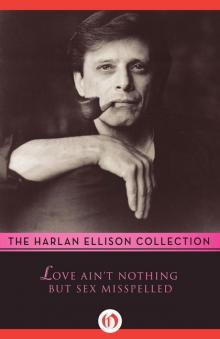 Love Ain't Nothing but Sex Misspelled
Love Ain't Nothing but Sex Misspelled Stalking the Nightmare
Stalking the Nightmare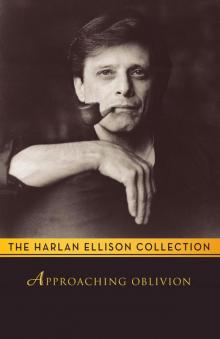 Approaching Oblivion
Approaching Oblivion Deathbird Stories
Deathbird Stories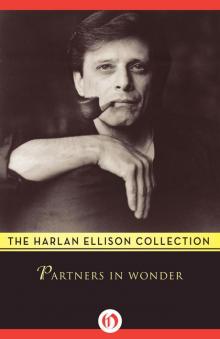 Partners in Wonder
Partners in Wonder Web of the City
Web of the City Spider Kiss
Spider Kiss A Boy and His Dog
A Boy and His Dog Shatterday
Shatterday Slippage: Previously Uncollected, Precariously Poised Stories
Slippage: Previously Uncollected, Precariously Poised Stories Repent, Harlequin! Said the Ticktockman
Repent, Harlequin! Said the Ticktockman Come to Me Not in Winter's White
Come to Me Not in Winter's White The Song the Zombie Sang
The Song the Zombie Sang The Other Glass Teat
The Other Glass Teat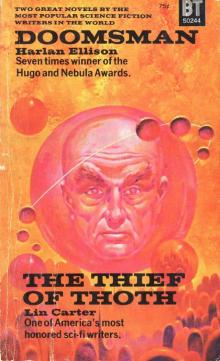 Doomsman - the Theif of Thoth
Doomsman - the Theif of Thoth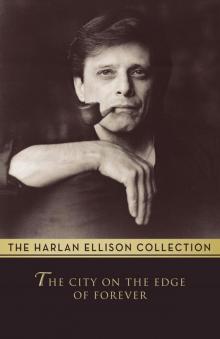 The City on the Edge of Forever
The City on the Edge of Forever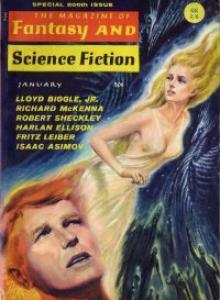 I See a Man Sitting on a Chair, and the Chair Is Biting His Leg
I See a Man Sitting on a Chair, and the Chair Is Biting His Leg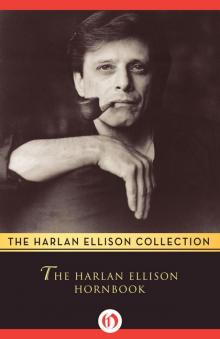 The Harlan Ellison Hornbook
The Harlan Ellison Hornbook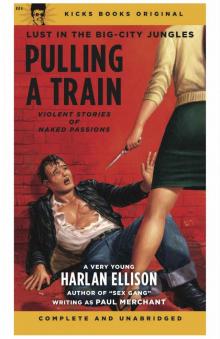 Pulling A Train
Pulling A Train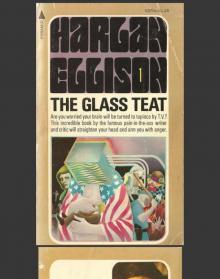 The Glass Teat - essays of opinion on the subject of television
The Glass Teat - essays of opinion on the subject of television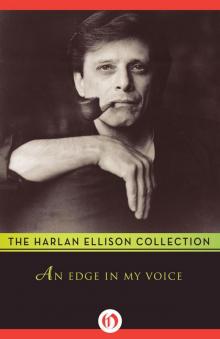 An Edge in My Voice
An Edge in My Voice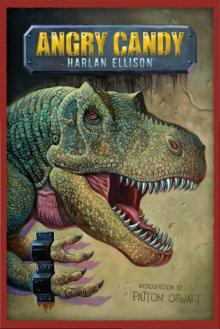 Angry Candy
Angry Candy Troublemakers
Troublemakers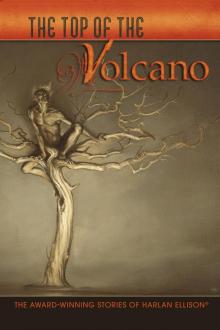 The Top of the Volcano
The Top of the Volcano Over the Edge
Over the Edge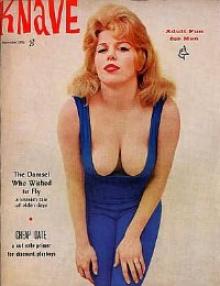 Survivor #1
Survivor #1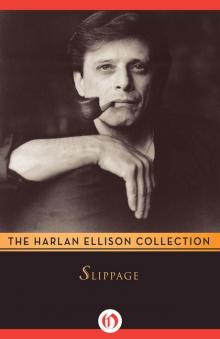 Slippage
Slippage